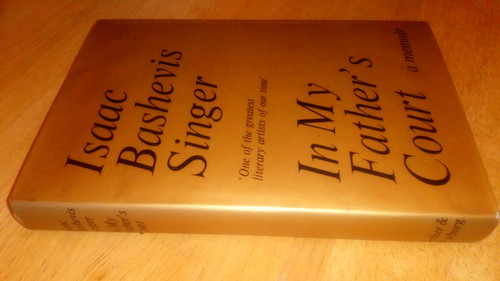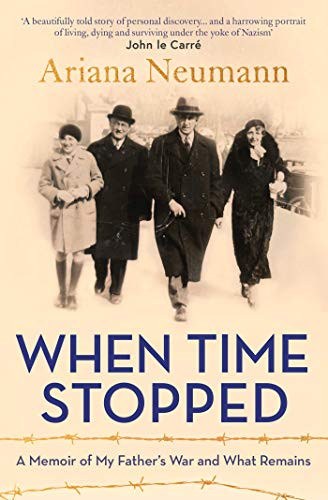Product Description
A hardcover 1st UK edition , Secker & Warburg,1967, following on from the 1st US edition, 1966, of Polish American author Isaac Bashevis Singer's memoir - In My Father's Court. Singer won the Nobel Prize in 1978, and his work has been filmed a number of times - most notably Yentl, and Enemies - A Love Story.
It was Jethro in the Old Testament, Isaac Bashevis Singer reminds us, who suggested to Moses that a court be set up for the people, made up of men of truth who hated covetousness. It was such a tribunal that Mr. Singer's father established in a room of his house in Warsaw in the decades before World War I. It was an uncommon institution because it had no legal standing and its decisions could not be enforced. It dealt more with ritualistic cleanliness and religious orthodoxy than with land, contracts or money. Its judgments were based as much on common sense as on Scripture, and its power depended ultimately on the probity and righteousness of the judge. It is index to the character of Mr. Singer's father that the court endured--even if it did not thrive--as long as it did.
From the cases he overheard as a child, Mr. Singer recalls the litigants, their pleas, their peculiar and sometimes baffling personalities. They are as distinct and individual as Chaucer's pilgrims and, in a way, almost as remote.
But ''In My Father's Court'' is no more a book about court cases than Turgenev's ''A Sportsman's Sketches'' is about hunting. For what Mr. Singer has done is to recreate that boiling, God-haunted world of Russian and Polish Jewry that existed within the larger world of Czarist Russia--a sphere that must have seemed to their neighbors puzzling, queer and impenetrable.
True, many of the chapters are complete in themselves; the story of the washerwoman so duty bound that she fought off death itself until the last piece of linen was delivered, clean. In the starkness of the telling, it reminded me of Isak Dinesen's masterpiece, ''Sorrow Acre.'' There is the portrait of the man who, knowing that he is incurably ill and childless, divorces his wife so that she would not have to marry his brother, as the old levirate custom demanded. There are two geese, beheaded and quite dead, who give out shrieks of agony. All of these episodes are related with Mr. Singer's idiomatic flair and sure skill.
But more than all these is the life he builds up for the reader--puritanical, obsessed with ritual purity, isolated and withdrawn. Everything beyond the door was ''unclean.'' It was a world that honored learning by letting the woman labor and their scholar-husbands pore over books: Scripture and commentary, Zohar and cabala, bending their ingenuity to the deciphering of the cryptic and hidden meanings lying therein. If there was a sainted rabbi somewhere in the family line, their pride equalled those of the families in Debrett or the Almanach de Gotha. It was a world that lived from the Sabbath to the Sabbath--the day that brought peace and joy and that justified the hardships of the rest of the week.
Although there is mention of wealth, poverty was endemic and constant. Men lived in cellars, in unbelievably dark hallways, scratching for a living, breeding disease. Strange customs, folkways and beliefs flourished. One man would never walk by a gathering of women alone; another slept in his clothes so that he would be ready when the Messiah came. Old Traitl was so obsessed with his daughters' dowries that he went on begging for them long after they married.
A part of his remembrance recalls the development of his own mind and sensibility. although he lived in slums and was poor, he makes nothing traumatic out of the fact. He remembers rather the warmth and security of his home, the fascination of the court cases, the rumble of distant conflicts and new notions, the poignant and immediate world of nature, in an unexpected view of the sky or the presence of a green leaf attached to an apple. It was a world that was crumbling, that was ruined in World War I, obliterated in World War II. This memoir brings it to life again, not as a museum piece but with its people and its life intact.
 Euro
Euro
 British Pound
British Pound













